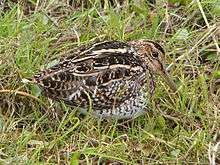South American snipe
| South American snipe | |
|---|---|
 | |
| Scientific classification | |
| Kingdom: | Animalia |
| Phylum: | Chordata |
| Class: | Aves |
| Order: | Charadriiformes |
| Suborder: | Scolopaci |
| Family: | Scolopacidae |
| Genus: | Gallinago |
| Species: | G. paraguaiae |
| Binomial name | |
| Gallinago paraguaiae Vieillot, 1816 | |
The South American snipe or Magellan snipe (Gallinago paraguaiae) is a small, stocky wader. Its taxonomic position is complicated, sometimes treated as a race of common snipe. The Andean population is now usually considered a distinct species, known as the puna snipe.
This small snipe breeds in most of South America away from the Pacific coast and eastern Brazil, and also the Falkland Islands, Trinidad and possibly Tobago The nominate lowland race G. p. paraguaiae is resident, but southern G. p. magellanicae migrates north in winter, abandoning Tierra del Fuego altogether.
The breeding habitat is wet grassy savannah for the northern form, peat bogs for magellanicae, and boggy rivers for andina. The nest is a well-hidden depression on the ground. Both parents incubate the two buff eggs for about 19 days to hatching, the precocial young leaving the nest soon after hatching.
The adult South American snipe is 27–29 cm in length and weighs 110 g. It has short greenish-grey legs and a very long straight dark bill. The body is mottled brown on top and pale underneath. There is a dark stripe through the eye, with light stripes above and below it. The wings are pointed. In northern South America, it is difficult to distinguish in the field from wintering common snipe, although they can be separated in the hand.
G. p. magellanicae, which breeds southwards from central Argentina and central Chile is longer-winged, warmer and more buff in colour than the northern race. South American snipes forage in soft mud, probing or picking up food by sight. They mainly eat insects and earthworms, also plant material.
The male performs a "winnowing" display during courtship, flying high in circles and then taking shallow dives to produce a distinctive sound. The call is a rasping tssk.
References
- ↑ BirdLife International (2012). "Gallinago paraguaiae". IUCN Red List of Threatened Species. Version 2013.2. International Union for Conservation of Nature. Retrieved 26 November 2013.
- Birds of Venezuela by Hilty, ISBN 0-7136-6418-5
- ffrench, Richard (1991). A Guide to the Birds of Trinidad and Tobago (2nd ed.). Comstock Publishing. ISBN 0-8014-9792-2.
- Shorebirds by Hayman, Marchant and Prater ISBN 978-0-395-60237-9
